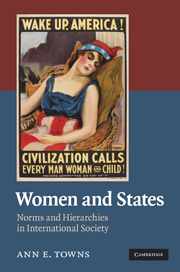Book contents
- Frontmatter
- Contents
- Tables
- Acknowledgments
- 1 Introduction
- 2 Constructivism and worldwide changes in state policy
- 3 A complex society of norms and social hierarchies
- 4 Excluding women in the society of civilized states
- 5 Women’s suffrage and the standards of civilization
- 6 National women’s policy bureaus and the standards of development
- 7 Legislature sex quotas and cultural rank
- 8 Conclusion
- Primary sources, by chapter
- Bibliography
- Index
4 - Excluding women in the society of civilized states
Published online by Cambridge University Press: 05 October 2013
- Frontmatter
- Contents
- Tables
- Acknowledgments
- 1 Introduction
- 2 Constructivism and worldwide changes in state policy
- 3 A complex society of norms and social hierarchies
- 4 Excluding women in the society of civilized states
- 5 Women’s suffrage and the standards of civilization
- 6 National women’s policy bureaus and the standards of development
- 7 Legislature sex quotas and cultural rank
- 8 Conclusion
- Primary sources, by chapter
- Bibliography
- Index
Summary
There are pervasive and longstanding presumptions among scholars and practitioners of international relations that the political empowerment of women is a phenomenon of European origin, rooted in Western Enlightenment and liberal traditions. The standard account is generally a more sophisticated variation on the following. For millennia, as a matter of tradition, women around the world were either oblivious to or helpless before their subjugation to men. With the rise of secularism and science, Europeans were not only relieved of the religious dogma that had undergirded such subjugation but also came to develop law within the constitutional state. The constitutional state became a blessing for women, as law placed bounds on the legitimacy of physical coercion (including that of men over women) and provided the tools for women to argue for equality of opportunity (including access to various state organs). The spread of European conceptualizations of women and the state then helped non-European women to become aware of their traditional misperceptions about sexual difference and pressured non-European states to take on institutions and adopt laws to halt male oppression.
The aim of this chapter is to re-evaluate and to a certain extent reverse the standard historical account of the political empowerment of women. Not only was the rise of liberalism and secularism joined with the exclusion of women from politics, as numerous historians and political theorists have long argued, but the Europeans, I contend, connected the omission of women from political life with an “advanced” or “civilized” state and helped spread this notion through colonialism. By the turn of the twentieth century, it was widely understood that “civilized” states kept women out of politics. Non-European societies that had made available a political role for women were chastised as “primitive” and “traditional” for doing so. In light of the contemporary admonishing of “tradition” as the source of the subjugation of women and the adjacent celebration of Western values and history as the foundation of the political emancipation of women, this discovery is astounding. What is more, European history itself further places in question the notion that “tradition” is the culprit for keeping women out of politics. During the European Middle Ages, women of the estates often had the formal ability to influence decision-making in the negotiations between the estates and the monarch. As an example, English abbesses were called to the first parliaments and women landowners could influence elections to the parliament on a par with men. To make the argument that the liberal, constitutional state of “civilized” Europe developed by excluding women from the polity, this chapter will analyze the transformation in the construction of women and the state in Europe from absolutism to the nineteenth century.
- Type
- Chapter
- Information
- Women and StatesNorms and Hierarchies in International Society, pp. 55 - 80Publisher: Cambridge University PressPrint publication year: 2010



